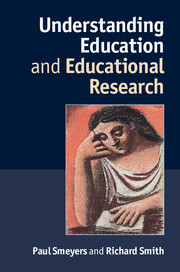Book contents
- Frontmatter
- Contents
- Acknowledgements
- Introduction
- 1 Education and its research
- 2 The nature of social science
- 3 The idea of method
- 4 The nature of philosophy
- 5 The art of research
- 6 Language, truth and meaning
- 7 On the dominant nature of educational research and its shortcomings
- 8 Research, policy and practical reasoning
- 9 The limits of measurement
- 10 Parenting and government intervention in the family (case study I)
- 11 Researching happiness and well-being (case study II)
- 12 Philosophy and research
- Notes
- References
- Index
1 - Education and its research
Published online by Cambridge University Press: 05 November 2014
- Frontmatter
- Contents
- Acknowledgements
- Introduction
- 1 Education and its research
- 2 The nature of social science
- 3 The idea of method
- 4 The nature of philosophy
- 5 The art of research
- 6 Language, truth and meaning
- 7 On the dominant nature of educational research and its shortcomings
- 8 Research, policy and practical reasoning
- 9 The limits of measurement
- 10 Parenting and government intervention in the family (case study I)
- 11 Researching happiness and well-being (case study II)
- 12 Philosophy and research
- Notes
- References
- Index
Summary
The debate concerning the proper procedures of the social sciences, with the implications that might hold for the study of education, has not reached unambiguous conclusions. In summary, this debate has been between those who argue that the so-called ‘scientific method’ of the ‘empirical’ natural sciences (mainly quantitative approaches) should be mimicked, and those who emphasise the role of interpretation in all understanding and enquiry (mainly qualitative approaches). It cannot be doubted, however, that, through research as it is usually conceived, our knowledge has grown. Medicine, as we noted in the Introduction, is a good example of that. So in many important ways science is helpful. We build better bridges and buildings, and because we understand at a biochemical level how the body functions, we have better treatments of illnesses. But questions of what to do in an educational context are of a different kind. If you have to cross a bridge, it is indeed relevant to know that there is only a chance of one in a million (or billion) that it might collapse, never mind that in the end they will all fall apart, that no bridge will last forever. But if empirical research in what some might think of as the educational sciences used the same criteria as those applied by the engineer, the consequences would be self-defeating. Indeed, that ‘bridge’ to reality would fall to pieces. Social scientists content themselves usually with the fact that there are many variables in play and that ‘more research needs to be done’. It is touching to witness their perseverance, as it is overwhelmingly the case that their paradigmatic model does not achieve its aims. All of this does not mean that the social scientist, as a rational human being, has nothing to offer for educational practice, but his insights are conducive to understanding in the sense of bringing clarity rather than leading directly to prescriptive conclusions, and where we have clarity we are less inclined to intervene in the wrong ways.
- Type
- Chapter
- Information
- Understanding Education and Educational Research , pp. 13 - 28Publisher: Cambridge University PressPrint publication year: 2014



